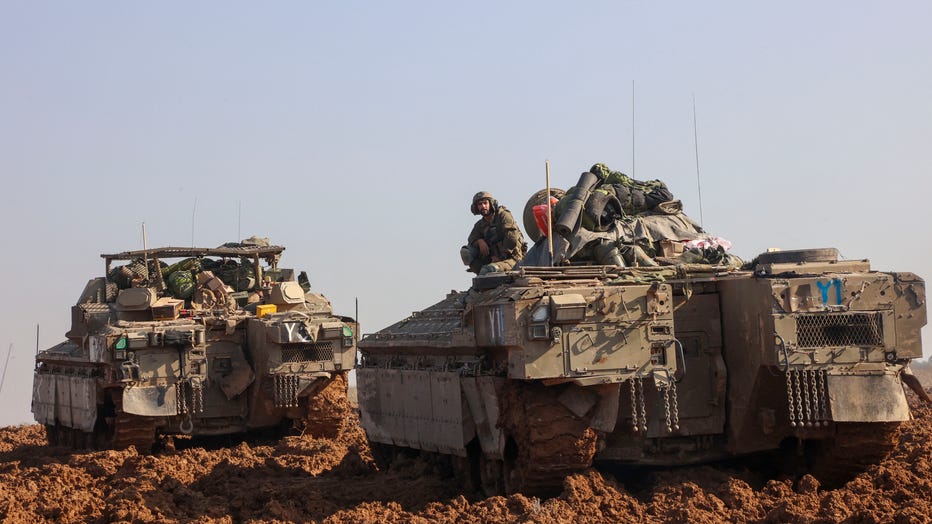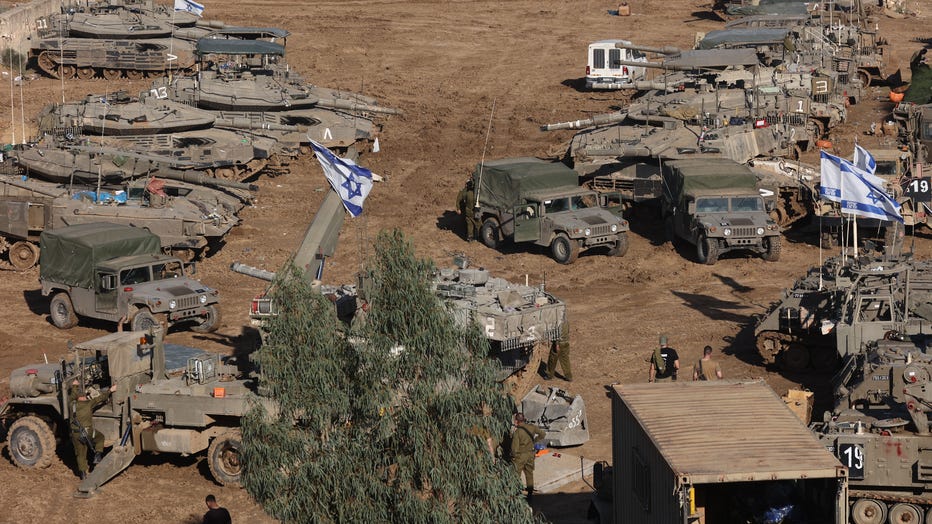Israeli troops mistakenly killed 3 Israeli hostages in Gaza, IDF says
The Israeli military on Friday mistakenly killed three Israeli hostages during its ground operation in the Gaza Strip, military officials said.
The army’s chief spokesman, Rear Adm. Daniel Hagari, said Israeli troops found the hostages and erroneously identified them as a threat. He said it was not clear if they had escaped their captors or been abandoned.
The deaths occurred in the Gaza City area of Shijaiyah, where troops have engaged in fierce battles against Hamas militants in recent days.
He said the army expressed "deep sorrow" and was investigating.
Belev Echad helping wounded Israeli soldiers
Israeli Special Forces veteran Or Porat first came to Belev Echad in 2016, after be injured in an attack. The organization helps wounded Israeli soldiers recover from their injuries. Now, he's a volunteer with the group who is now helping some 1,000 Israeli soldiers recover in the wake of the Israel-Hamas war.
The deaths were announced as a U.S. envoy said the U.S. and Israel were discussing a timetable for scaling back intense combat operations in the war against Hamas, even though they agree the overall fight will take months.
U.S. national security adviser Jake Sullivan also met with Palestinian President Mahmoud Abbas to discuss the besieged enclave's postwar future, which, according to a senior U.S. official, could include bringing back Palestinian security forces driven from their jobs in Gaza by Hamas in its 2007 takeover.
MORE: US vetoes UN resolution calling for ceasefire in Gaza
American and Israeli officials have been vague in public about how Gaza will be run if Israel achieves its goal of ending Hamas control. The notion that Palestinian security forces could return was floated as one of several ideas. It appeared to be the first time Washington offered details on its vision for security arrangements in the enclave.
Any role for Palestinian security forces in Gaza is bound to elicit strong opposition from Israel, which seeks to maintain an open-ended security presence there and says it won't allow a postwar foothold for the Abbas-led Palestinian Authority, which administers parts of the Israeli-occupied West Bank but is deeply unpopular with Palestinians.
In meetings with Israeli leaders on Thursday and Friday, Sullivan discussed a timetable for winding down the intense combat phase of the war.

Israeli tanks are deployed in southern Israel near the border with the Gaza Strip on December 15, 2023, amid ongoing battles between Israel and the Palestinian militant group Hamas. (Photo by GIL COHEN-MAGEN/AFP via Getty Images)
Israeli Defense Minister Yoav Gallant told Sullivan that it would take months to destroy Hamas, but he did not say whether his estimate referred to the current phase of heavy airstrikes and ground battles.
Sullivan said Friday that "there is no contradiction between saying the fight is going to take months and also saying that different phases will take place at different times over those months, including the transition from the high-intensity operations to more targeted operations."
He said he discussed a timeline with Prime Minister Benjamin Netanyahu and Israel’s War Cabinet, and that such conversations would continue during an upcoming visit by U.S. Defense Secretary Lloyd Austin.
READ MORE: US announces visa bans to Jewish Israeli settlers who attack West Bank Palestinians
The offensive, triggered by the unprecedented Oct. 7 Hamas attack on Israel, has flattened much of northern Gaza and driven 80% of Gaza’s population of 2.3 million from their homes. Displaced people have squeezed into shelters mainly in the south in a spiraling humanitarian crisis.
U.S. President Joe Biden’s administration has expressed unease over Israel’s failure to reduce civilian casualties and its plans for the future of Gaza, but the White House continues to offer wholehearted support for Israel with weapons shipments and diplomatic backing.
Israel-Hamas war could last 'several months'
The Israel-Hamas war could last 'several months' Israel Defense Minister Yoav Gallant warned, as the U.S. pushes Israel to scale back its military operations in Gaza amid rising civilian casualties.
"I want them to be focused on how to save civilian lives," Biden said Thursday when asked if he wants Israel to scale down its operations by the end of the month. "Not stop going after Hamas, but be more careful."
While battered by the Israeli onslaught, Hamas has continued its attacks. On Friday, it fired rockets from Gaza toward central Israel, setting off sirens in Jerusalem for the first time in weeks but causing no injuries. The group's resilience called into question whether Israel can defeat it without wiping out the entire territory.
Israelis remain strongly supportive of the war and see it as necessary to prevent a repeat of Oct. 7, when Palestinian militants attacked communities across southern Israel, killing around 1,200 people, mostly civilians, and taking some 240 hostage. A total of 116 soldiers have been killed in the ground offensive, which began Oct. 27.
Israeli government spokesman Eylon Levy said militants have fired 12,500 rockets since Oct. 7, including more than 2,000 that fell short and landed in Gaza.
Israel’s air and ground assault over the past 10 weeks has killed more than 18,700 Palestinians, according to the Health Ministry in Gaza. Thousands more are missing and feared dead beneath the rubble.
The ministry does not differentiate between civilian and combatant deaths. Its latest count did not specify how many were women and minors, but they have consistently made up around two-thirds of the dead in previous tallies.
Communications services still appeared to be down across Gaza on Friday, 24 hours after telecommunications provider Paltel said they were cut due to ongoing fighting.
Israeli airstrikes and tank shelling continued Friday, including in the southern city of Rafah, part of the shrinking areas of tiny, densely populated Gaza to which Palestinian civilians had been told by Israel to evacuate. At least one person was killed, according to an Associated Press journalist who saw the body arriving at a local hospital.
The Qatar-based television network Al Jazeera said Friday that an Israeli strike killed one of its journalists in Gaza, Palestinian cameraman Samer Abu Daqqa. The strike also wounded the network’s chief correspondent in Gaza, Wael Dahdouh. The two were reporting on the grounds of a school in the southern Gaza city of Khan Younis when the strike hit, the network said.

Israeli armoured vehicles and troops are deployed in southern Israel, near the border with the Gaza Strip on December 15, 2023, amid ongoing battles between Israel and the Palestinian militant group Hamas. (Photo by GIL COHEN-MAGEN/AFP via Getty Imag
Before Abu Daqqa’s death, at least 63 journalists have been killed since the conflict erupted between Hamas and Israel on Oct. 7, according to the media freedom organization, The Committee to Protect Journalists. They include 56 Palestinians, four Israelis and three Lebanese.
Dahdouh, a veteran of covering Israel-Gaza wars, was wounded by shrapnel in his right arm.
In the West Bank, Sullivan met Friday with Abbas, who lost control of Gaza when Hamas drove out his security forces in 2007. The takeover came a year after Hamas defeated Abbas' Fatah party in parliament elections and the rivals failed to form a unity government.
A senior U.S. official said that Sullivan and others have discussed the prospect of having those associated with the Palestinian Authority security forces before the Hamas takeover serve as the "nucleus" of postwar peacekeeping in Gaza.
It was one idea of many being considered for establishing security in Gaza, said the official, who spoke on condition of anonymity in line with White House ground rules. He said such talks were taking place with Israel, the Palestinian Authority and regional partners.
The U.S. has said it eventually wants to see the West Bank and Gaza under a unified Palestinian government as a precursor to a Palestinian state — an idea soundly rejected by Netanyahu, who leads a right-wing government that is opposed to Palestinian statehood.
Palestinian officials have said they will only consider a postwar role in Gaza in the context of concrete U.S.-backed steps toward Palestinian statehood.
In the meeting, Abbas called for an immediate cease-fire and ramped-up aid to Gaza, and emphasized that Gaza is an integral part of the Palestinian state, according to a statement from his office. It made no mention of conversations about postwar scenarios.
As part of those scenarios, Washington has called for revitalizing the Palestinian Authority, without letting on whether such reforms would require personnel changes or general elections, which last took place 17 years ago.
The 88-year-old Abbas is deeply unpopular, with a poll published Wednesday indicating close to 90% of Palestinians want him to resign. Meanwhile, Palestinian support for Hamas has tripled in the West Bank, with a small uptick in Gaza, according to the poll. Still, a majority of Palestinians do not back Hamas, according to the survey.

